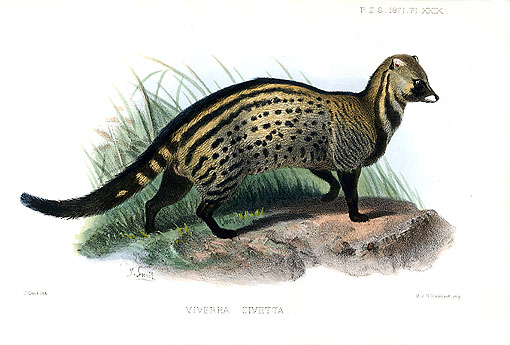Civet
From Wikipedia, the free encyclopedia
[Photo] African Civet (Civettictis civetta); Viverra civetta (Currently: Civettictis civetta (Schreber, 1776)). Source http://www.classicnatureprints.com/pr.Smit%20Mammals/smit.mam1.index.html Author Joseph Smit. License: public domain.
Scientific classification
Kingdom: Animalia
Phylum: Chordata
Class: Mammalia
Order: Carnivora
Family: Viverridae (in part)
Genera
Chrotogale
Cynogale
Diplogale
Hemigalus
Arctogalidia
Macrogalidia
Paguma
Paradoxurus
Civettictis
Viverra
Viverricula
Civets are mammals, most of which are species in the family Viverridae. They are small, lithe-bodied, mostly arboreal members of the order Carnivora. General appearance is broadly cat-like, but the muzzle is extended and often pointed, rather like an otter or a mongoose. Civets range in length, excluding its long tail, from about 17 to 28 in (400 to 700 mm) and in weight from about 3 to 10 lb (1 to 5 kg).
Viverrids are native to most of the Old World tropics, nearly all of Africa bar the area immediately south of the Mediterranean, Madagascar, and the Iberian Peninsula. Favoured habitats include woodland, savanna, mountains and, above all, tropical rainforest. In consequence, many are faced with severe loss of habitat; several species are considered vulnerable and the Otter Civet is classified as endangered.
Although it resembles the other civets, the African Palm Civet (Nandinia binotata) is genetically distinct and belongs in its own monotypic family, Nandiniidae.
Breeding occurs year round; gestation is 60-81 days. Some species may have 2 litters per year. Each litter may contain 1-6 babies who are fully furred at birth. Very little is known about their mating habits.
Civets are omnivorous, supplementing a meat diet (both hunted and scavenged) with fruit, eggs, and possibly roots. One of the Common Palm Civet's favorite fruits is the coffee "berry." The coffee bean within often survives, and it is sometimes gathered and sold as caphe cut chon (fox-dung coffee) in Vietnam or Kopi Luwak (civet coffee) in Indonesia.
Despite their endangered species status, civets are also prized for their meat.
It has been suggested that the practice of eating palm civets may have resulted in the SARS virus outbreak of 2003. In January 2004, Guangdong province in China banned sales and ordered the slaughter of all captive civets. In January 2004 the United States announced an embargo on the importation of civets.
In 2005, the WWF released photos taken by a night time camera trap of an unknown carnivore (nicknamed the cat-fox) on Borneo, an island of Indonesia. Some scientists think it is either a new species of civet, or that it is one of the more rare species finally being spotted in modern times, such as Hose's Palm Civet.
The civet has been the source of a highly-valued musk, used as a stabilizing agent in perfumes. Although civets were at one time killed for their musk, they more recently have been "recycled" for this purpose. Also called "civet," excretions are scraped from the civet's perianal glands, a painful process. Both male and female civets produce these strong-smelling excretions. At least one civet farmer in Ethiopia raises civets for their musk, although this practice is dying out as perfumers move toward using synthetic fixatives. This musk, in strong amounts, has caused vomiting in humans.
http://en.wikipedia.org/wiki/Civet
| The text in this page is based on the copyrighted Wikipedia article shown in above URL. It is used under the GNU Free Documentation License. You may redistribute it, verbatim or modified, providing that you comply with the terms of the GFDL. |
|

